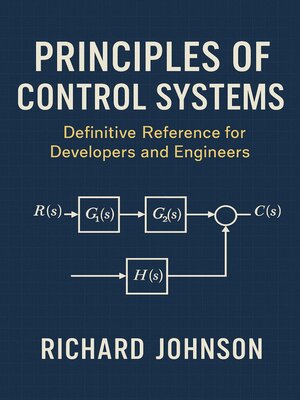Principles of Control Systems
ebook ∣ Definitive Reference for Developers and Engineers
By Richard Johnson

Sign up to save your library
With an OverDrive account, you can save your favorite libraries for at-a-glance information about availability. Find out more about OverDrive accounts.
Find this title in Libby, the library reading app by OverDrive.



Search for a digital library with this title
Title found at these libraries:
| Library Name | Distance |
|---|---|
| Loading... |
"Principles of Control Systems"
"Principles of Control Systems" presents a comprehensive and rigorous exploration of both classical and modern techniques fundamental to the design, analysis, and implementation of control systems. Beginning with the foundational concepts of system classification, feedback mechanisms, and modeling paradigms, the book expertly guides readers through state-space representation, performance metrics, and the essential mathematical underpinnings of control system behavior. Its meticulously structured chapters progress from the basics of differential and difference equation modeling to advanced methods of system identification, linearization, and block diagram algebra, ensuring a solid grounding for students and professionals alike.
As the text advances, readers are equipped with practical methodologies for both time-domain and frequency-domain analysis, including root locus techniques, sensitivity analysis, and classical approaches such as PID controller tuning and compensator design. The treatment of stability considerations is thorough, ranging from traditional Nyquist criteria to modern robustness evaluations. Special emphasis is placed on bridging classical and state-space methods, with detailed explorations of controllability, observability, optimal control, and state estimation, preparing readers for the challenges of high-order, multivariable, and uncertain systems.
Reflecting the latest developments in the field, the book delves into digital and discrete-time control, nonlinear and adaptive control architectures, as well as intelligent and robust system strategies. Real-world applications are interwoven throughout, with chapters devoted to emerging topics such as distributed control, model predictive control, fault-tolerant systems, and the integration of AI and machine learning in cyber-physical and autonomous environments. "Principles of Control Systems" serves as both a definitive reference and a practical guide, empowering engineers, researchers, and students to master the evolving landscape of modern control engineering.







